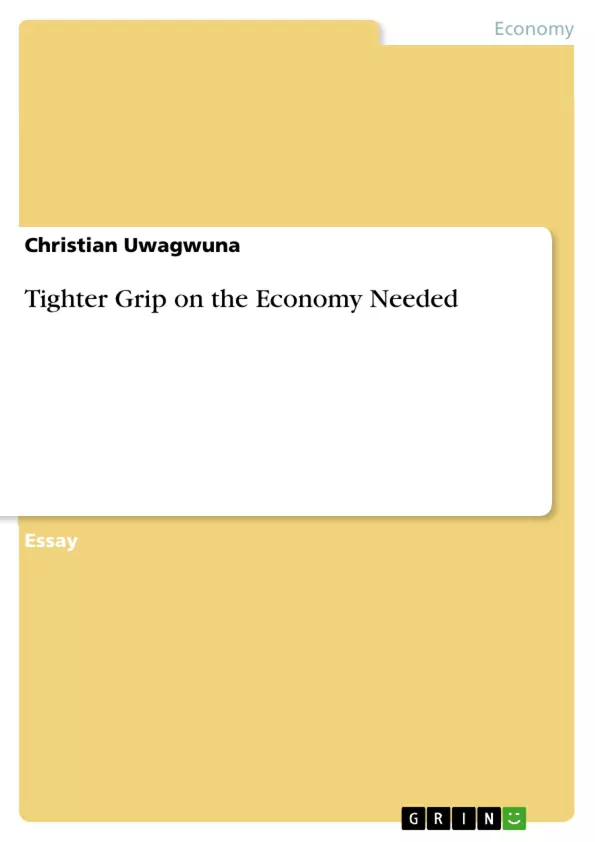The purpose of this paper is to consider the rationale of economic regulation, why regulation has
welfare benefits and why consumers of financial services, particularly retail consumers demand
regulation of the economy.
A poll carried out by the BBC showed that most people want their government to have more control
over the running of their economy. However, some academic liberals (Bentson, 1998) are skeptical
of the benefits of such regulation. These critics of economic regulation argues variously as follows;
that there is no market failures and imperfections, and that if they do exist they are not sufficiently
serious to warrant regulation, and that regulation may not practically solve these failures and
imperfections, and that if it does, it can only do so by imposing cost that might exceed the cost of
the original problem, and that imposing regulation raises serious moral hazards, and finally, that
regulation imposes a wide range of cost which is ultimately borne by consumers.
Inhaltsverzeichnis (Table of Contents)
- Introduction
- The Context of Economic Regulation
- Economic Regulation as a Process
- The Rationale for Economic Regulation
- Potential systemic problems associated with externalities
- Market imperfections and failures
- Economies of scale in monitoring
- Consumer confidence with positive externality
Zielsetzung und Themenschwerpunkte (Objectives and Key Themes)
The paper explores the rationale behind economic regulation, examining why regulation offers welfare benefits and why consumers, particularly in the retail sector, demand government intervention in the economy.
- The role of government intervention in regulating market economies.
- The justification for economic regulation in the face of market failures and imperfections.
- The benefits of regulation for consumers in terms of consumer confidence and information asymmetry.
- The concept of economies of scale in monitoring and the role of regulatory agencies.
- The impact of regulation on welfare and the potential for improved economic stability.
Zusammenfassung der Kapitel (Chapter Summaries)
The introduction outlines the paper's purpose: to investigate the rationale behind economic regulation, highlighting the benefits for consumers and the economy as a whole. It explores the historical context of economic regulation, including the shift towards more limited government intervention in recent years, and introduces the core concept of market failures as a justification for regulation.
The section on the context of economic regulation examines the debate surrounding government intervention in the economy. It presents arguments both for and against regulation, highlighting the potential benefits of a more controlled economy, such as stability and protection against market failures. However, it also acknowledges criticisms, such as the potential for increased costs and moral hazard.
Economic regulation is further explored as a process, with the paper outlining various forms and methods of regulation, including the creation of regulatory agencies to manage conflicts between commercial interests and public needs. This section also discusses the role of regulation in ensuring the delivery of essential services, providing examples such as the regulation of alcohol, food, and media.
The rationale for economic regulation is then examined in detail, focusing on four key areas: potential systemic problems associated with externalities, market imperfections and failures, economies of scale in monitoring, and consumer confidence with positive externality. Each of these areas provides a compelling argument for government intervention in the economy to protect consumers and ensure market stability.
Schlüsselwörter (Keywords)
The paper focuses on economic regulation, market failures, consumer protection, information asymmetry, economies of scale in monitoring, welfare benefits, and government intervention.
Frequently Asked Questions about Economic Regulation
What is the rationale for economic regulation?
Economic regulation is justified by market failures, externalities, and information asymmetries, aiming to protect consumers and ensure systemic stability in the economy.
How do externalities necessitate government intervention?
Externalities are costs or benefits not reflected in market prices. Regulation helps manage potential systemic problems associated with these externalities to prevent market instability.
What is information asymmetry in financial services?
It occurs when one party (usually the provider) has more or better information than the other (the retail consumer), leading to potential exploitation that regulation seeks to prevent.
Do regulatory costs exceed the benefits?
Critics argue that regulation imposes costs eventually borne by consumers. However, proponents highlight welfare benefits and the prevention of even costlier market collapses.
What role do regulatory agencies play?
Regulatory agencies manage conflicts between commercial interests and public needs, ensuring fair competition and the delivery of essential services like food safety and financial oversight.
- Arbeit zitieren
- BA Christian Uwagwuna (Autor:in), 2010, Tighter Grip on the Economy Needed, München, GRIN Verlag, https://www.grin.com/document/170699



